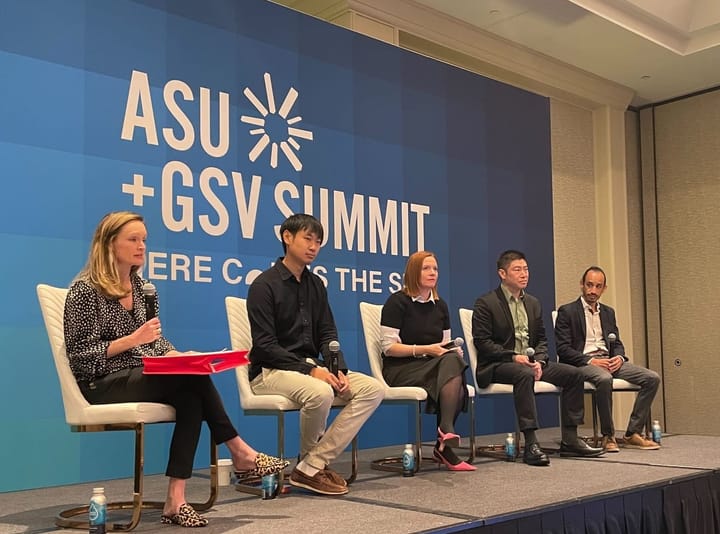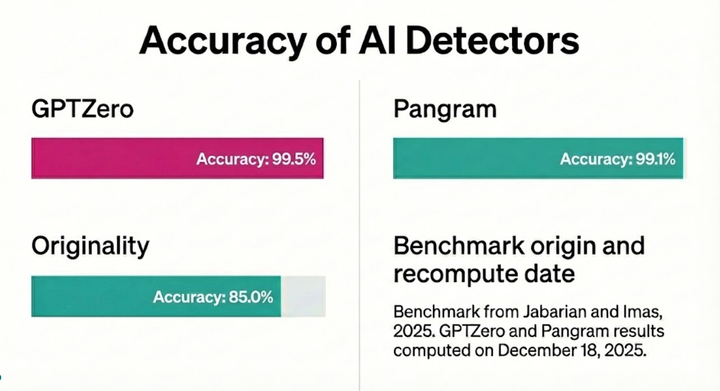The Evolution of AI Detection — and a GPTZero and Turnitin Rematch

ASU+GSV Summit 2024 kicked off April 14-17, 2024 in San Diego to bring together thought leaders with a common goal: elevate the scope and scale of innovation in the education sector.
In a packed room and much anticipated session, GPTZero CEO Edward Tian sat down with Turnitin CPO Annie Chechitelli to debate the role of AI in academic integrity, and their differing philosophies.
The moment marked a year since Edward sat across Turnitin CEO Chris Caren in San Diego, which catalysed the start of GPTZero and Turnitin’s increasingly divergent approaches to AI adoption.
Stanford University Associate Professor Victor Lee, Lottus Education CPO Andres Fleiz Jaso and Associate Partner at McKinsey Katie Krieg also joined them on the panel last week.
On the panel, Edward reflected on AI developments over the past year and highlighted three significant developments in GPTZero’s approach in identifying AI, distinct from the plagiarism detection model.
- AI detection is no longer binary
A year+ ago, Edward was sitting on a similar ASU-GSV panel with the CEO of Turnitin and there was a lot of initial fear around AI and a narrow focus on plagiarism detection to maintain academic integrity. GPTZero has since changed the AI narrative from ‘catching students and penalizing them for using AI’ to advocating for a nuanced understanding. In this panel, Edward discussed the biggest evolution in AI detection is that it’s no longer binary. It’s no longer, ‘it’s AI or not‘ or ‘it’s bad or good’. It’s an exploration of intent, usage and ethical considerations. It’s about asking questions like, ‘was AI used thoughtfully and purposefully?’, ‘was it 10% AI generated or 90%?’, ‘were the AI sources correct or were there copyright risks?’.
- Seize opportunity for dialogue
Once you find AI in a student's work, it’s the opportunity to start the conversation, not stop it. Contrary to viewing AI detection as a punitive measure, Edward stressed the importance of using these instances as teachable moments to foster critical thinking and ethical awareness. GPTZero even put a disclaimer on every scan saying, “don’t punish your students, this is not plagiarism”.
- This is also an opportunity for students to learn
Edward discussed the importance that, “the same tools for AI transparency that teachers are using should be available for students.” He gave an example of a New York Times journalist using GPTZero to investigate whether biographies of deceased celebrities that were launched on Amazon the day of celebrities deaths were generated by AI. GPTZero allows anyone to conduct this research not just a student assessing their own work but the entire internet as they are thrown into a world that is filled with misinformation and AI generated text.
Watch highlights from the panel:
GPTZero CEO, Edward Tian, at ASU+GSV Summit 2024
As education embraces AI technologies, it becomes imperative to drive a culture of responsible AI usage grounded in ethical principles that prioritizes integrity, equity and transparency. ASU+GSV’s mission is “to create a world in which ALL people have equal access to the future.” It was natural alignment for GPTZero to attend since with our free tier of AI detection, anyone is able to uncover whether text was written by human or AI, demystifying and preparing humans for the increasingly AI-driven world.
Until next year ASU+GSV!


